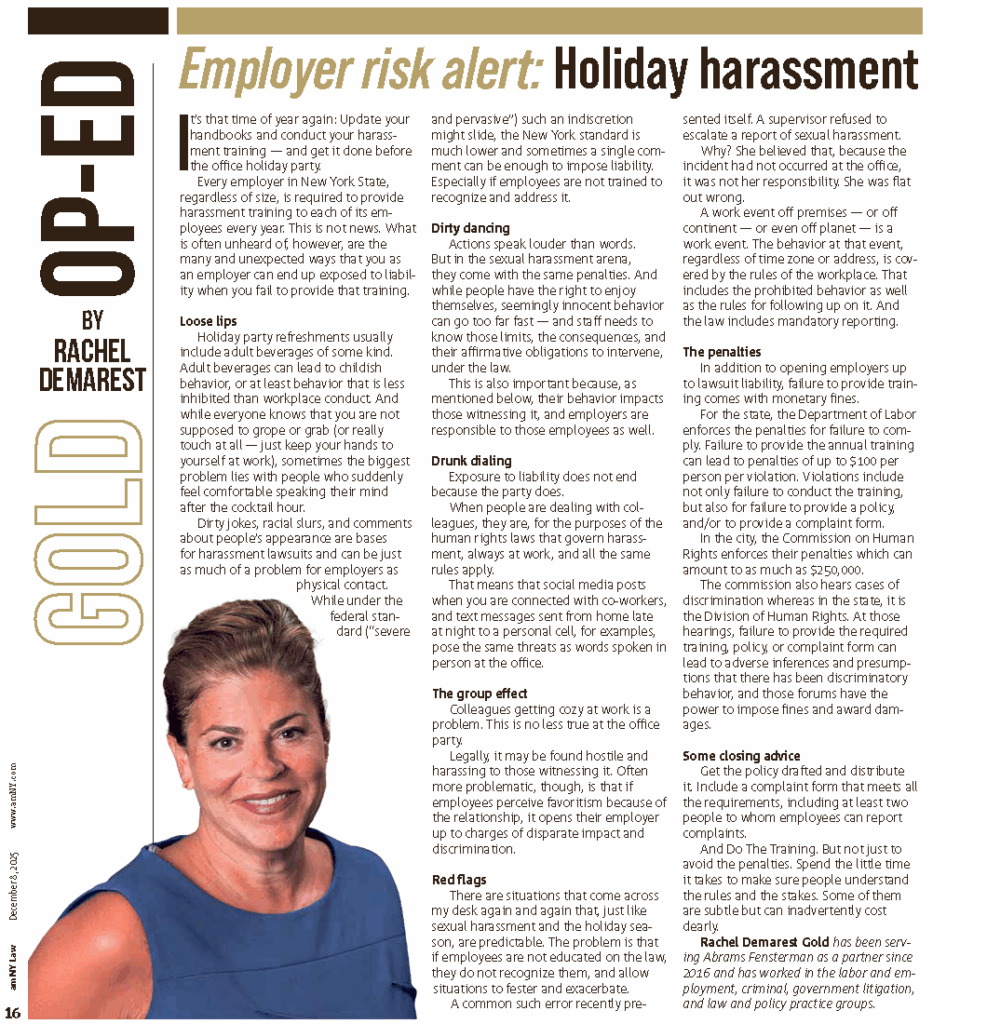As the new year begins, New York State is imposing a hefty new obligation on virtually all employers.
As a result of the Wage Theft Prevention Act enacted last year, all private sector employers in New York must have each of their employees sign an acknowledgment of wage rate between January 1 st and February 1 st of each year, beginning in 2012.
Federal, state and local government employers are not covered, but charter schools, private schools, and not-for-profit corporations are.
Section 195 of the Labor Law, as amended by the Act, requires that employers provide notice to employees of their rate(s) of pay, designated pay day, the employer’s intent to claim allowances (like tip or meal allowances) as part of the minimum wage, and the basis of wage payment (whether paying by hour, shift, day, week, piece, etc.). The law requires that the notice contain the employer’s “doing business as” names, and that it be provided at the time of hiring; annually on or before February 1st of each year of employment; and within 7 days of a change if the change is not listed on the employee’s pay stub for the following pay period.
The Notice can be found on the Labor Department website, but employers can use their own notices so long as they contain the required information. We recommend several changes to the form itself, as well as giving significant thought to how it is completed. In fact, obtaining the signed form is an excellent opportunity to review your employment practices to confirm whether you are paying your employee as required in New York.
The Notice must contain the following information:
• The employee’s rate(s) of pay;
• The basis of the employee’s rate(s) of pay (e.g. by the hour, shift, day, week, salary, piece, commission, or other);
• Whether the employer intends to claim allowances as part of the minimum wage, including tip, meal, or lodging allowances, and the amount of those allowances;
• The employee’s regular pay day designated by the employer in accordance with the frequency of pay requirements in the Labor Law;
• The name of the employer and any “doing business as” names used by the employer;
• The physical address of the employer’s main office or principal place of business, and a mailing address, if different;
• The telephone number of the employer; and
• “Such other information as the commissioner deems material and necessary.”
The Notice requires the employer to specify whether the employee is exempt or non-exempt, and the method of payment for non-exempt employees (hourly, salaried, etc.). It is optional to specify which exemption applies. We suggest that employers not specify the exemption, particularly since more than one exemption could apply to a given employee.
In the event that the employee’s primary language is other than English, the acknowledgment must be in the employee’s primary language. So far, the Labor Department had created templates in English, Spanish, Chinese, Korean, Creole, Polish and Russian Some employers that we represent are having the form we have revised for them translated into the primary language of their non-English-speaking employees.
If an employee’s wages are decreased, a new acknowledgment must be obtained at least 7 days before the new pay rate is effective.
New York Law already requires that there be a signed agreement for employees who are paid on a commissioned basis, and the signed commission agreement must be attached to the Acknowledgment of Wage Rate.
The Labor Department has agreed that the Notices can be procured electronically so long as the employee can print out a copy of the Notice, and the employer keeps a copy of the signed acknowledgment.
As with most wage-related records, the signed Notices need to be retained for 6 years, even if the employee terminates employment earlier.
The law imposes stiff penalties for failure to procure a signed acknowledgment of wage rate. The penalty is $50 per week, up to a maximum of $2500, together with costs and reasonable attorney’s fees. There is an affirmative defense for an employer to present, that the employee was paid the correct wages on a timely basis, or the employer did not believe that compliance with the requirement was necessary.
With additional duties comes a new opportunity to audit your work-related rules to make sure that they comply with ever-increasing legal requirements. Our employment law attorneys are always delighted to meet with employers to determine how we can efficiently help them to comply with the Labor Department’s rules.
For more information about employment-related issues, please contact Sharon P. Stiller, Esq. or your attorney contact at our firm.





